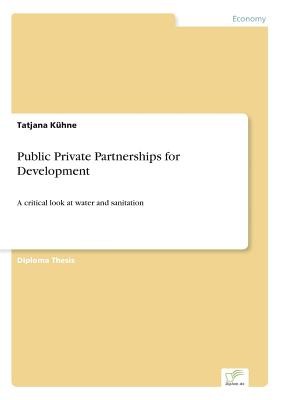
- We will send in 10–14 business days.
- Author: Tatjana Kühne
- Publisher: Diplom.de
- Year: 2003
- Pages: 80
- ISBN-10: 3838673409
- ISBN-13: 9783838673400
- Format: 14.8 x 21 x 0.5 cm, softcover
- Language: English
- SAVE -10% with code: EXTRA
Reviews
Description
Inhaltsangabe: Abstract: Public-private partnerships are a tool that is increasingly used by development agencies to improve infrastructure in developing countries. This concept is also employed in piped water provision. The failure of some major projects suggests that there is considerable risk involved when the public and private sectors combine forces. The fact that piped water provision is a natural monopoly and therefore needs extensive regulation makes the cooperation between the public and private sector very difficult. Indeed, weak regulation is the probably the most important risk factor. Other risk factors include political instability, inadequate tariff and contract design, and lack of public support. These risk factors are analyzed using four case studies, two failed ones and two that are considered relatively successful. The analysis aims to find answers to the question whether the initiative of development agencies to heavily promote the concept of public-private partnerships in water and sanitation is justified and appropriate. Einleitung: Public-private partnerships werden im verstärkten MaÃe von Institutionen für Entwicklungshilfe eingesetzt, um die Infrastruktur in Entwicklungsländern zu verbessern. Dieses Konzept wird unter anderem auch in der Wasserversorgung verwendet. Das Fehlschlagen von einigen wichtigen Projekten weist darauf hin, dass ein gewisses Risiko existiert, wenn der öffentliche Sektor und die Privatwirtschaft zusammen arbeiten. Der Fakt, dass Wasserversorgung ein natürliches Monopol ist und daher besonders starke Regulierung braucht, erschwert die Kooperation zwischen öffentlichen Sektor und Privatwirtschaft. Ungenügende Regulierung ist möglicherweise der wichtigste Risikofaktor. Andere Risikofaktoren sind politische Instabilität, ein schlecht gestaltetes Gebührensystem, ein ungenauer Vertrag und fehlende Unterstützung der Bevölkerung und der Regierung. Diese Faktoren werden mit Hilfe von vier Fallbespielen analysiert, zwei g
EXTRA 10 % discount with code: EXTRA
The promotion ends in 20d.11:07:08
The discount code is valid when purchasing from 10 €. Discounts do not stack.
- Author: Tatjana Kühne
- Publisher: Diplom.de
- Year: 2003
- Pages: 80
- ISBN-10: 3838673409
- ISBN-13: 9783838673400
- Format: 14.8 x 21 x 0.5 cm, softcover
- Language: English English
Inhaltsangabe: Abstract: Public-private partnerships are a tool that is increasingly used by development agencies to improve infrastructure in developing countries. This concept is also employed in piped water provision. The failure of some major projects suggests that there is considerable risk involved when the public and private sectors combine forces. The fact that piped water provision is a natural monopoly and therefore needs extensive regulation makes the cooperation between the public and private sector very difficult. Indeed, weak regulation is the probably the most important risk factor. Other risk factors include political instability, inadequate tariff and contract design, and lack of public support. These risk factors are analyzed using four case studies, two failed ones and two that are considered relatively successful. The analysis aims to find answers to the question whether the initiative of development agencies to heavily promote the concept of public-private partnerships in water and sanitation is justified and appropriate. Einleitung: Public-private partnerships werden im verstärkten MaÃe von Institutionen für Entwicklungshilfe eingesetzt, um die Infrastruktur in Entwicklungsländern zu verbessern. Dieses Konzept wird unter anderem auch in der Wasserversorgung verwendet. Das Fehlschlagen von einigen wichtigen Projekten weist darauf hin, dass ein gewisses Risiko existiert, wenn der öffentliche Sektor und die Privatwirtschaft zusammen arbeiten. Der Fakt, dass Wasserversorgung ein natürliches Monopol ist und daher besonders starke Regulierung braucht, erschwert die Kooperation zwischen öffentlichen Sektor und Privatwirtschaft. Ungenügende Regulierung ist möglicherweise der wichtigste Risikofaktor. Andere Risikofaktoren sind politische Instabilität, ein schlecht gestaltetes Gebührensystem, ein ungenauer Vertrag und fehlende Unterstützung der Bevölkerung und der Regierung. Diese Faktoren werden mit Hilfe von vier Fallbespielen analysiert, zwei g


Reviews